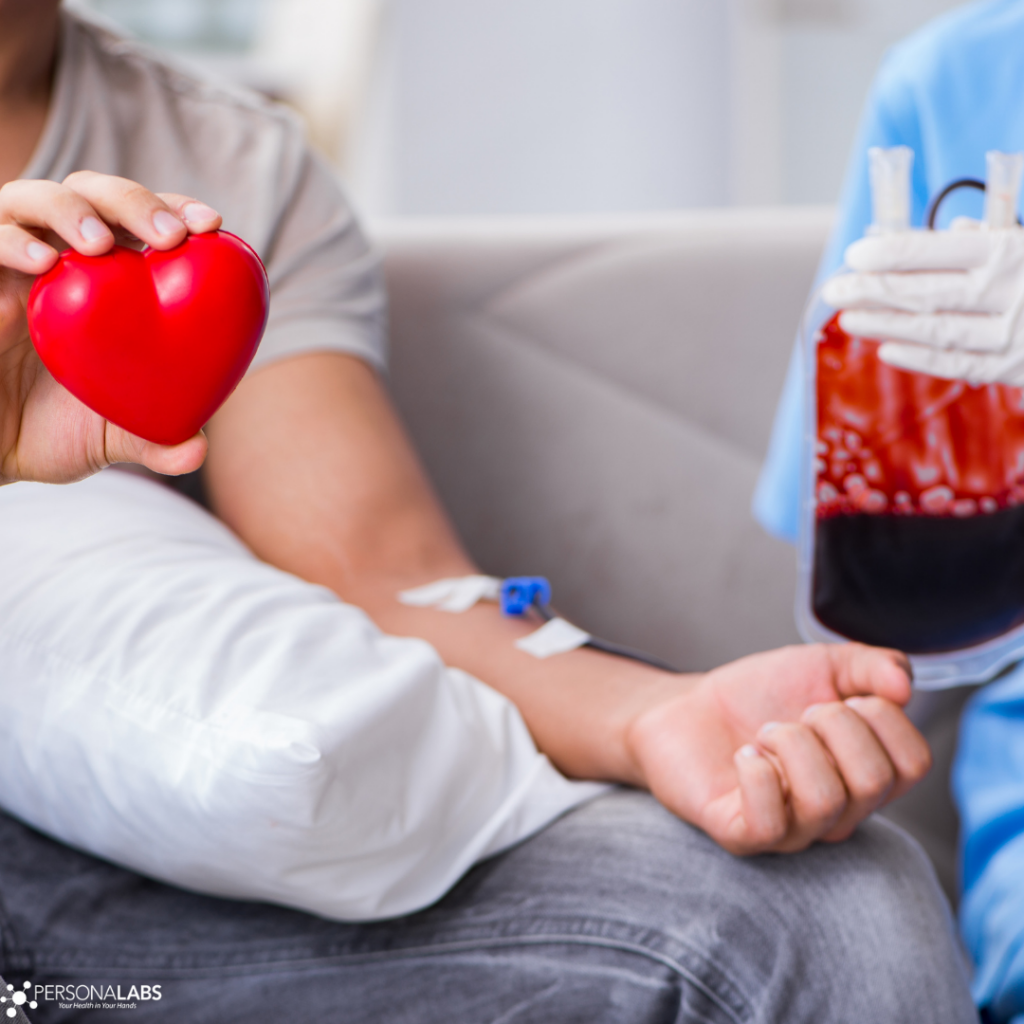- Fast results
- 4,000+ locations
- 4.8 star rating
Need Help? (888) GET LABS


You may have encountered the term anemia on at least one occasion relating to a certain medical issue. In general, we associate anemia with blood disorders. However, sometimes it’s a cause of concern, especially when you have a poor diet.
But what many people don’t know is that anemia comes in different types. The most common of which is iron-deficiency anemia, often resulting from a lack of enough iron in your diet or the body’s inability to process iron.
In most cases, adding iron supplements or iron-riced food to your diet can improve the condition. However, the need for more serious treatment depends on the condition.
However, if left untreated, iron deficiency anemia can cause severe damage to your health leading to complications that could endanger your life.
On the other hand, if the condition is diagnosed early and treatment ensues, you can restore good health in no time.

Iron deficiency anemia is a condition characterized by an insufficient number of healthy red blood cells (RBC).
RBCs or erythrocytes are a vital component of the blood. They deliver oxygen from the lungs to the different tissues in the body. And as we know, oxygen is essential for cells to function. Inadequate oxygen can endanger your life or cause deterioration in the organs’ functions.
With that in mind, if RBCs are lacking, it also leads to inadequate oxygen supply. But what causes RBC shortage?
In iron-deficiency anemia, the primary reason for insufficient RBC is the lack of enough iron, which is an integral element of hemoglobin formation when RBCs are produced. Hemoglobin is the particular protein that collects oxygen from the lungs for intercellular transport.
The human body has no other means of supplying iron aside from absorbing it from the food we eat.
Daily intake of iron depends on age and sex. For example, men over 18 and women over 50 need 8.7 mg of iron per day.
For women aged 19 to 50, 14.8 mg of iron should suffice for your daily intake. This discrepancy between the adult male and female iron requirements has something to do with the menstrual cycle.
Naturally, since women lose blood every cycle, the body will have to compensate and produce twice as many RBCs.
Iron deficiency anemia is a result of drastic blood loss or insufficient RBC production due to limited iron supply. To be more specific, here are some of the most common causes of this type of anemia.
Poor diet often leads to vitamin and minerals deficiency. There is a clear link between lack of proper nutrition and the risk of a person becoming anemic.
For example, according to a study published in the journal for Aging Clinical and Experimental Research, anemia becomes prevalent among the elderly in nursing homes due to malnutrition and the associated risks for the condition.
By extension, a preferred diet also influences your susceptibility to iron deficiency anemia. Meat is a common source of iron. Shellfish, red meat, liver, other organ meats, and poultry are rich in iron.
Unfortunately, these are also types of food vegans and vegetarians opt to avoid. As a result, they need to uptake their iron supplementation or increase their consumption of iron-rich grains and vegetables like quinoa, broccoli, legumes, and spinach.
Considering the fact that there are alternative sources of iron aside from meat, non-meat-eating individuals can have the same level of risks for low iron intake as that of the general population.
However, it could be different for women who adopt these diets.
A study published in the American Journal of Lifestyle Medicine showed that vegetarian women at the premenopausal stage are more likely to develop iron-deficiency anemia than their nonvegetarian counterparts.
So, it is vital to get tested for nutrient deficiencies if you’re a vegetarian or vegan.
You could have enough iron in your diet but still, develop iron-deficiency anemia. This could be due to malabsorption or the inability of the intestine to absorb iron from food.
Iron malabsorption is common in individuals with intestinal disorders like celiac disease.
If you haven’t heard about celiac disease, it is a disorder where the affected individual experiences adverse effects against gluten, a type of protein commonly found in wheat and rye.
It is sometimes difficult to know about internal blood loss, especially if it occurs within the gastrointestinal tract.
However, if you have been diagnosed with iron-deficiency anemia and all other causes are crossed out from your evaluation, it could indicate chronic internal bleeding caused by ulcers, polyps, and even cancer.
Blood loss in the intestines aggravates low iron intake since you are losing RBCs during pregnancy and your body can’t produce more to compensate for the loss. Hence, it is imperative to diagnose the condition immediately.
Women essentially experience blood loss. However, for those who have irregular periods, episodes of bleeding can be longer and have much more volume of blood to shed.
These conditions can lead to iron-deficiency anemia. Hence, it is not uncommon for women to experience dizziness, fainting, or headaches when they have their menstrual period.
Iron supplements are often included in the list of prenatal vitamins and minerals pregnant women have to take.
A woman’s body needs to produce more blood to support fetal growth. Therefore, it is pretty normal for mild anemia to develop.
However, if the body is not able to produce more RBCs, it could lead to severe iron-deficiency anemia, which can affect maternal and fetal health.
Anemia can be life-threatening based on the type you have.
Iron-deficiency anemia is generally mild in nature and can be corrected as soon as treatment follows. However, it can lead to severe damages if neglected or left untreated.
For example, severe iron deficiency anemia is found in many individuals who have had heart failure. On the other hand, anemic children are known to experience growth delays and other developmental problems.
Nonetheless, there are other types of anemia that are more life-threatening and should not be taken for granted.

While iron deficiency anemia is often mild in symptoms, it can aggravate health complications if not diagnosed and treated early. The chances of this anemia being fatal is slim but the
Here are some of the health problems associated with iron deficiency anemia.
Severe iron deficiency anemia can lead to cardiovascular problems. It often starts with a fast or irregular heartbeat.
Since RBCs are short in number, the heart has to work twice as hard to deliver oxygen to the cells. This overexertion can eventually lead to problems such as left ventricular dysfunction. It can also lead to heart failure and heart enlargement if you don’t seek treatment.
The risks of pregnancy complications such as preterm labor and placental abruption increases when the mother has iron deficiency anemia.
The volume of blood produced during pregnancy has to be double or more than the regular production. This is to protect and support the development of the fetus. Hence, low iron leading to reduced RBC production leads to serious issues concerning fetal and maternal health.
Furthermore, stillbirth is also associated with iron-deficiency anemia. But even after successful delivery, the infant often has low birth weight. Moreover, the mother has a higher susceptibility to postpartum depression.
The risk for infections increases with iron-deficiency anemia, especially among children. The lack of RBCs affects the immune cells and the body’s immunity as a whole.
Iron deficiency anemia suppresses immune responses vital to fight off disease-causing microbes or pathogens. As a result, anemic individuals easily develop diseases and medical conditions, especially parasitic infections.
Research has backed up claims that iron deficiency anemia contributes to mental health problems such as depression, general anxiety, psychotic disorders, and even sleeping disorders.
Generally, low iron is linked to reduced serotonin levels. Serotonin is a neurotransmitter that regulates and stabilizes mood and emotions. It is sometimes referred to as the “happy chemical.”
Therefore, if you have low serotonin levels, you are prone to mental health problems like depression.
The Complete Blood Count will reveal the number of blood cells which include your RBCs, white blood cells (WBCs), and platelets. Low RBCs can be associated with iron deficiency anemia.
Iron blood tests with total iron binding capacity are designed to measure the amount of iron in your blood and how the iron is spread in the body.
The ferritin blood test evaluates how your body stores iron. Together with the iron blood test, it can assess iron deficiency or overload.
Iron deficiency anemia is not generally a cause of major concern. However, it doesn’t mean that you should simply slip it under the rug.
Not seeking treatment and proper care can lead to health complications that could damage your health.
If you are feeling symptoms of iron deficiency anemia, don’t hesitate to consult your doctor and get the right tests to diagnose and confirm the condition.

© Copyright 2025 Personalabs. All Rights Reserved.